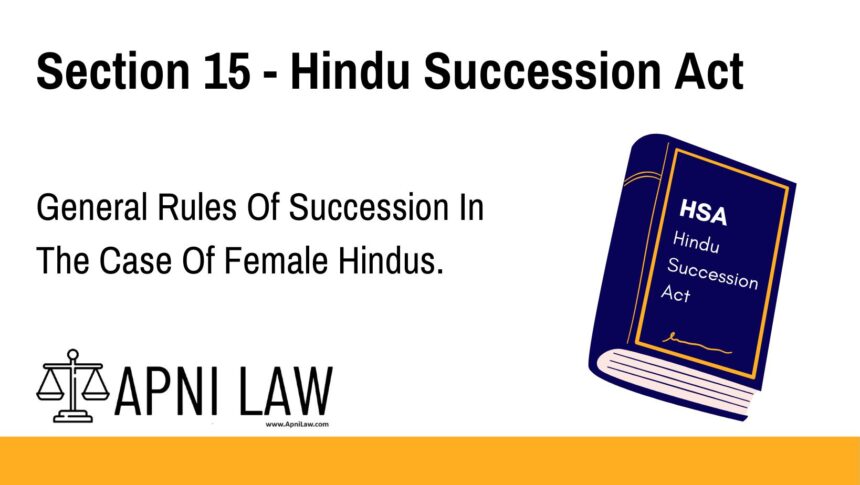Code: Section 15 Hindu Succession Act
General Rules of Succession for Female Hindus
15.
(1) The property of a female Hindu dying intestate shall devolve according to the rules set out in section 16:
(a) Firstly, upon the sons and daughters (including the children of any pre-deceased son or daughter) and the husband;
(b) Secondly, upon the heirs of the husband;
(c) Thirdly, upon the mother and father;
(d) Fourthly, upon the heirs of the father; and
(e) Lastly, upon the heirs of the mother.
(2) Notwithstanding anything contained in sub-section (1):
(a) Any property inherited by a female Hindu from her father or mother shall devolve, in the absence of any son or daughter of the deceased (including the children of any pre-deceased son or daughter), not upon the other heirs referred to in sub-section (1) in the order specified therein, but upon the heirs of the father;
(b) Any property inherited by a female Hindu from her husband or from her father-in-law shall devolve, in the absence of any son or daughter of the deceased (including the children of any pre-deceased son or daughter), not upon the other heirs referred to in sub-section (1) in the order specified therein, but upon the heirs of the husband.
State Amendment (Kerala)
- Amendment of Section 15:
- In the Hindu Succession Act, after clause (b) of sub-section (2), the following clause shall be inserted:
“(c) Any property inherited by a female Hindu from her pre-deceased son shall devolve, not upon the other heirs referred to in sub-section (1) in the order specified therein, but upon the heirs of the pre-deceased son from whom she inherited the property.”- [vide Kerala Act 17 of 2016, sec. 2]
- In the Hindu Succession Act, after clause (b) of sub-section (2), the following clause shall be inserted:
Explanation of Section 15 – Hindu Succession Act
Section 15 of the Hindu Succession Act outlines the general rules of succession when a female Hindu dies intestate (without a will). The section provides a clear hierarchy for determining who inherits her property, ensuring a structured and organized process.
Key Provisions:
- General Order of Succession: The property will first pass to the children (including those of pre-deceased children) and the husband. If no children or husband exist, it will then go to the husband’s heirs, followed by the mother and father, and then the heirs of the father and mother, in that order.
- Property Inherited from Parents: If the property was inherited by the female Hindu from her father or mother, and if there are no children, it will go to the heirs of the father, not following the usual order of succession.
- Property Inherited from Husband or Father-in-Law: Similarly, property inherited from the husband or father-in-law will be passed to the heirs of the husband if no children are present.
- Kerala Amendment: A specific amendment in Kerala stipulates that any property inherited from a pre-deceased son shall devolve upon the heirs of that pre-deceased son, not following the general rules of succession outlined in the section.
Illustration
Example 1: General Succession
- A female Hindu dies intestate with a surviving husband and two children. According to Section 15(1)(a), her property will first go to her children (including children of any pre-deceased son or daughter), and her husband will also have a share.
Example 2: Property Inherited from Father
- A female Hindu inherits property from her father but has no children. In this case, according to Section 15(2)(a), her father’s heirs will inherit the property instead of following the general order of succession outlined in Section 15(1).
Example 3: Kerala State Amendment
- A female Hindu inherits property from her pre-deceased son. According to the Kerala amendment in Section 15(2)(c), the property will pass to the heirs of the pre-deceased son, not to the general heirs under the standard order of succession.
Common Questions and Answers on Section 15 – Hindu Succession Act
1. Who inherits the property of a female Hindu under Section 15?
- Answer: The property of a female Hindu dying intestate will generally go to her children and husband first, and if they are not present, the property will pass to other relatives in a specific order as outlined in Section 15(1).
2. How does the property of a female Hindu inherited from her father or mother devolve?
- Answer: If a female Hindu inherits property from her father or mother and has no children, the property will pass to the heirs of her father or mother, not following the general order of succession.
3. What is the Kerala amendment to Section 15?
- Answer: The Kerala amendment adds a clause (c) to Section 15, stating that property inherited by a female Hindu from her pre-deceased son will pass to the heirs of that son, not following the general order of succession outlined in Section 15(1).
4. What happens if a female Hindu inherits property from her husband?
- Answer: If a female Hindu inherits property from her husband and has no children, the property will pass to her husband’s heirs, as per Section 15(2)(b).
Conclusion
Section 15 of the Hindu Succession Act provides a clear framework for the devolution of property in the event of the death of a female Hindu intestate. The rules prioritize the distribution of property to her children and husband, with specific rules for property inherited from her parents or spouse. The Kerala amendment further clarifies the succession of property inherited from a pre-deceased son.








